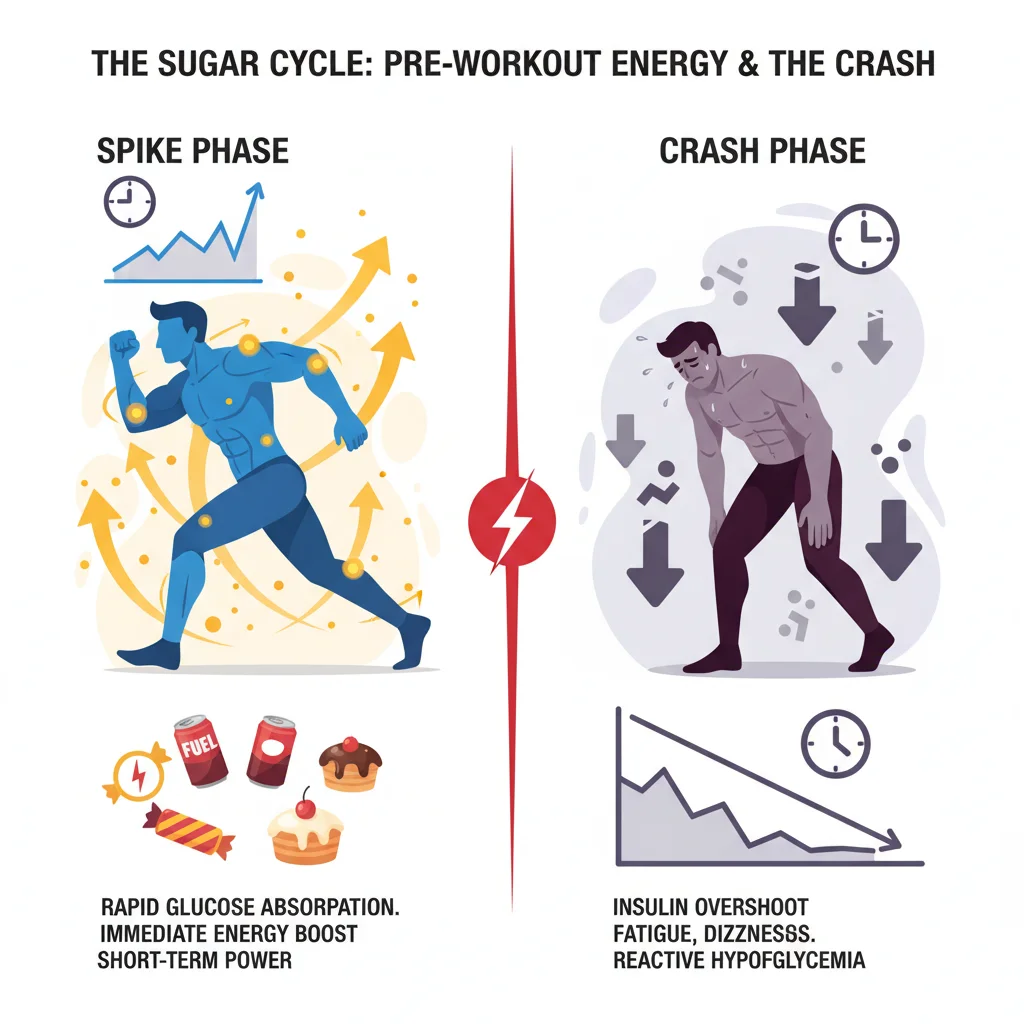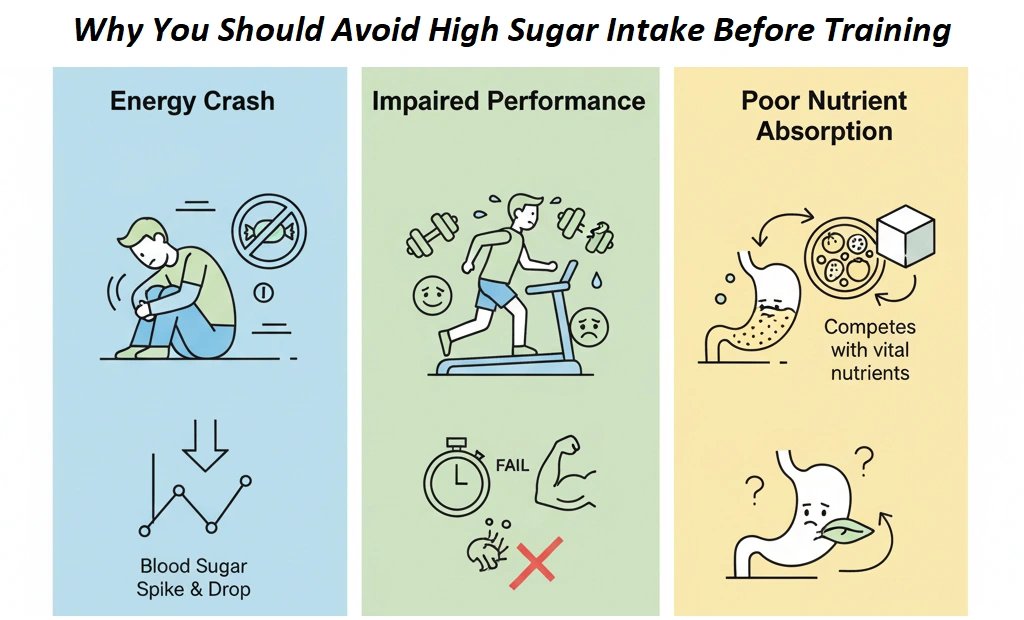Pre-workout nutrition plays a critical role in determining how effectively you perform, how you feel during exercise, and how well you recover afterward. Many people believe that eating sugary snacks or drinking energy beverages before training is a smart way to get a quick energy boost. After all, sugar is a fast-digesting carbohydrate that provides glucose, the body’s primary fuel.
However, while sugar can provide a short-term surge of energy, consuming too much of it before training often backfires. Instead of sustained focus and power, you may experience an energy crash, mental fatigue, and even digestive discomfort midway through your workout. To optimize performance, it’s important to understand how sugar affects the body, why timing matters, and what smarter pre-workout nutrition strategies look like.
The Science of Sugar and Energy Metabolism
1. How Sugar Is Processed in the Body
When you consume sugary foods or beverages—such as candy, soda, pastries, or sweetened energy drinks—your body rapidly breaks them down into glucose. This glucose enters the bloodstream, causing a quick rise in blood sugar levels. In response, the pancreas releases insulin, the hormone responsible for transporting glucose into cells for immediate energy use or storage.

- Spike Phase: The initial rise in blood glucose gives you a temporary energy boost.
- Crash Phase: Insulin overshoot may cause blood sugar to dip below baseline, leaving you feeling drained, hungry, or unfocused.
This cycle is known as reactive hypoglycemia and is a common consequence of consuming large amounts of simple sugars before training.
2. Role of Glycogen in Exercise
Muscles store glucose in the form of glycogen, which serves as the primary energy source during exercise. While some sugar intake can help replenish glycogen, consuming it right before training doesn’t necessarily improve performance. Instead, complex carbohydrates eaten in advance provide a steadier release of glucose and better support sustained energy output.
3. Hormonal Impact
Beyond blood sugar, high sugar intake influences several hormones:
- Insulin: Spikes rapidly, followed by a drop, which may impair fat burning during exercise.
- Cortisol: Stress hormones may rise if blood sugar crashes, increasing fatigue and perceived exertion.
- Dopamine: Sugar stimulates reward pathways, but over-reliance can reduce natural motivation and create dependency.
Why High Sugar Intake Before Training Can Be Problematic
1. The Mid-Workout Crash
The biggest issue with high sugar intake is the energy crash that follows the initial spike. Instead of steady energy, you may feel sudden fatigue halfway through your session. This is especially detrimental during strength training or endurance workouts that require consistent effort.
2. Reduced Fat Utilization
When blood sugar and insulin levels are elevated, your body prioritizes burning glucose rather than mobilizing fat stores. For athletes or individuals aiming to improve body composition, this can limit fat loss efficiency.
3. Digestive Distress
Sugary beverages and snacks may cause bloating, stomach cramps, or nausea when consumed too close to exercise, particularly during high-intensity or endurance training. Liquids with high sugar concentration (like sodas or fruit juices) can also delay gastric emptying, leading to discomfort.
4. Mental Fatigue
A sugar crash doesn’t just affect physical energy—it also impacts cognitive function. Reduced blood sugar availability to the brain can lead to poor focus, slower reaction times, and lower motivation during exercise.
When Sugar May Be Useful in Training
Not all sugar is harmful in the context of exercise. In fact, there are strategic times when consuming simple carbs can be beneficial:
- During Endurance Exercise (90+ minutes): Sports drinks, gels, or fruit can provide glucose to maintain glycogen levels and delay fatigue.
- Post-Workout Recovery: A moderate amount of simple carbs combined with protein helps replenish glycogen and accelerate muscle repair.
- High-Intensity Competition: Athletes who need quick energy bursts (e.g., sprinters, CrossFit competitors) may benefit from small amounts of fast-digesting carbs right before an event.
The key takeaway is that sugar can be a tool—but only when timed properly and consumed in moderation.
Smarter Pre-Workout Nutrition Choices
1. Complex Carbohydrates for Steady Energy
Instead of refined sugar, choose complex carbs that digest more slowly and release glucose gradually. Examples include:
- Oatmeal with fruit
- Brown rice or quinoa
- Sweet potatoes
- Whole-grain bread
These foods provide a stable energy supply without sharp spikes or crashes.
2. Include Lean Protein
Adding protein to pre-workout meals helps maintain satiety, stabilizes blood sugar, and supports muscle repair. Examples:
- Chicken or turkey with rice
- Greek yogurt with berries
- Plant-based protein shakes
3. Healthy Fats in Moderation
Fats take longer to digest and are not ideal immediately before training, but small amounts can help sustain energy during longer sessions. Examples:
- Nut butter on whole-grain toast
- Avocado slices
- Chia or flax seeds in a smoothie
4. Hydration First
Water or electrolyte beverages are essential for fluid balance, thermoregulation, and endurance. Dehydration, even as little as 2%, can reduce performance significantly.
Sample Pre-Workout Meal Ideas
1–2 Hours Before Training:
- Oatmeal topped with banana slices and almond butter
- Grilled chicken with sweet potato and vegetables
- Whole-grain wrap with turkey, spinach, and hummus
30–45 Minutes Before Training (Quick Fuel):
- Banana with peanut butter
- Rice cake with almond butter and honey
- Small protein smoothie with berries and oats
Special Considerations by Training Type
1. Strength Training
Balanced meals with protein and complex carbs 1–2 hours before lifting support glycogen stores and prevent fatigue. Avoid high-sugar snacks that cause fluctuations in strength mid-session.
2. Endurance Training
For runs or cycling sessions under 90 minutes, complex carbs and hydration are sufficient. For longer events, intra-workout simple carbs may be beneficial.
3. High-Intensity Interval Training (HIIT)
Stable energy from complex carbs prevents early fatigue. High sugar intake before HIIT can lead to early crashes and reduce output.
4. General Fitness and Weight Loss
Those training for weight loss or body composition should avoid high sugar intake, as it reduces fat mobilization and may trigger overeating later in the day.
Long-Term Strategies to Reduce Reliance on Sugar
- Plan meals ahead: Having balanced meals prevents last-minute sugary snack choices.
- Improve sleep: Adequate rest reduces cravings for fast-digesting carbs.
- Manage stress: Meditation, deep breathing, and exercise lower cortisol-driven sugar cravings.
- Retrain taste buds: Gradually reducing added sugar helps the body adapt and lowers long-term cravings.
Frequently Asked Questions
1. Is it bad to eat fruit before a workout?
No. Whole fruits like bananas or berries contain natural sugars but also provide fiber, vitamins, and minerals. They are much better options than processed sugary foods.
2. Should I completely avoid sugar before training?
Not always. Small amounts of natural sugar from fruit can be beneficial, but large amounts from processed foods should be avoided.
3. What if I only have time for a quick snack before exercise?
Choose simple but balanced options like a banana with nut butter, a protein bar with low sugar, or a small smoothie.
4. Do energy drinks help performance?
Many energy drinks are high in sugar and caffeine. While caffeine may enhance performance, the sugar content can lead to crashes. Sugar-free alternatives are often better.
Conclusion
While sugar can deliver a quick burst of energy, consuming large amounts before training is more likely to hinder performance than help it. The resulting blood sugar crash can reduce endurance, strength, and focus mid-session, while also contributing to digestive discomfort and limiting fat utilization.
A smarter strategy is to fuel your body with balanced meals that combine complex carbohydrates, lean protein, and healthy fats—providing steady energy and supporting recovery. For most workouts, this approach outperforms sugary snacks or drinks. The only exceptions are long-duration endurance events or immediate post-workout recovery, where targeted use of simple carbs can play a beneficial role.
By making more informed choices, you’ll not only avoid mid-session crashes but also enhance overall training quality, long-term results, and general health.
References
- Jeukendrup, A. E. (2014). Carbohydrate intake during exercise and performance. Nutrition.
- Ludwig, D. S. (2002). The glycemic index: physiological mechanisms relating to obesity, diabetes, and cardiovascular disease. JAMA.
- Ivy, J. L. (2004). Regulation of muscle glycogen repletion, muscle protein synthesis and repair following exercise. Journal of Sports Science & Medicine.
- Benton, D., & Young, H. A. (2017). Role of sugar in cognitive function. Nutrients.
- Burke, L. M. et al. (2011). Carbohydrates for training and competition. Journal of Sports Sciences.
